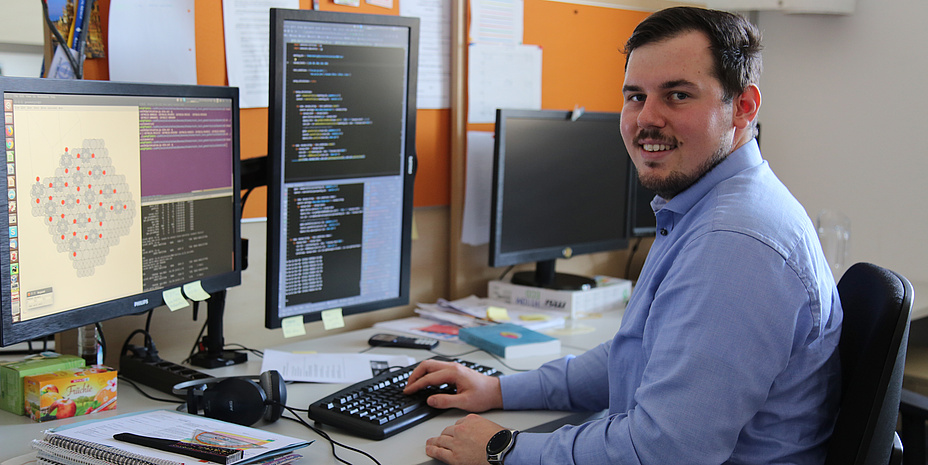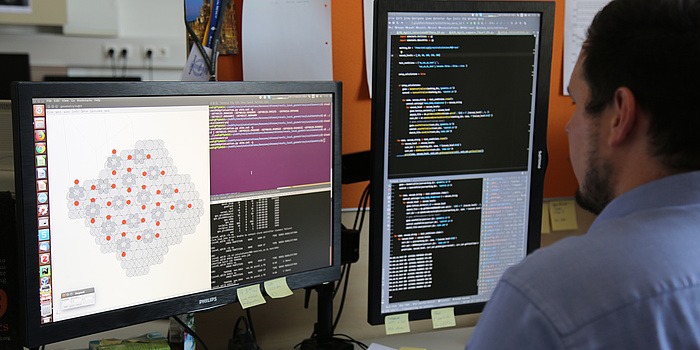Searching for the most efficient molecular recipe

The solid-state physicist was one of two young TU Graz researchers who attended the 69th Lindau Nobel Laureate Meeting.
Planet research: You recently had the chance to meet 39 Nobel laureates and discuss their lives and work. What was it like?
Andreas Jeindl: It was very exciting and unbelievably inspiring. There were various formats: conventional lectures on their work, “agora talks” with pitches and Q&A sessions, and in particular open discussions where the Nobel laureates were only available to answer questions for 45 minutes. This was an opportunity for detailed scientific discussions, but also to ask personal questions. For instance with Steven Chu, who won the Nobel Prize for his work on laser cooling before becoming energy minister in the US government and is now working in research again – in the field of biological physics. Things got really exciting there.
And some of the participants were asked to present their own projects using posters in two-minute pitches. That’s not easy at all. All 600 participants were physicists, but those who focus on gravitational waves have just as little to do with organic electronics, which is the field I work in, as I do with a mechanical engineer. But I learned a lot – especially about how I can explain my work.
I would do it again right now if I could, but young researchers are only allowed to attend once. I could only go back as a member of the Scientific Committee, or if I win a Nobel Prize myself (laughs).
And winning a Nobel Prize, that’s the goal for young researchers?
Jeindl: Another thing I learned at the meeting is that Nobel laureates are very committed people, but winning a Nobel prize is not just about scientific excellence, there’s a good deal of luck involved too. You have to do the right thing in the right place at the right time and know the right people as well. Apart from doing excellent work, I don’t know what else I could do to work towards this goal.
In my field, becoming director of a Max Planck Institute or a similar organisation is a more desirable target. A lot of the luminaries in my field are holding that post. And you can plan your career more precisely. Even if I didn’t quite make it to the director’s office, I would still be a professor at a very respectable university. You win a Nobel Prize if you launch a new field of research or do very innovative work in an existing field. If you make sound, significant contributions in an existing line of research, you work towards a professorship, but you won’t receive a Nobel Prize.

Andreas Jeindl uses simulation to built more efficient materials.
Can you give us a more detailed picture of the subject you work on, solid-state physics?
Jeindl: I’m part of a group headed by Oliver Hofmann, who won the START Prize last year for his MAP DESIGN project. We basically lay molecules on surfaces, and see how they arrange themselves in a geometric structure and which arrangement is the most effective in terms of energy. In our view, we can improve organic electronics if we can describe the first layer more accurately. For example, we work with organic LEDs, which today are built into a lot of mobile phone screens. Organic material is used for the active layers instead of non-organic semiconductors. These layers ensure that the LED emits light. But you also need to bring electrons into these active layers by means of a metal contact, and that’s what we’re looking to improve. It’s tough basic research, but maybe in a few years we’ll see devices based on our work which are better than the ones available today.
Research team leader Oliver Hofmann has been working on improving materials used to produce devices such as solar panels for several years. The article in Planet research, ‘Improved “energy harvest” in solar cells’, gives a deeper insight into this research topic.
Understanding the first layer is the focus of the first part of the START project. Ultimately, though, we want to give experimenters a recipe that they can use to build these devices more effectively. We want to be able to tell producers: use this pressure, this temperature and steam the material for such and such a time – and then you’ll achieve better results than you do today. You might call it the best recipe for the cake.
How did you become so fascinated by this subject?
Jeindl: I was very interested in chemistry at school. But I quickly realised that if you want to delve deep and really understand the fundamentals, it’s better to go into physics. So that’s why I studied physics. Solid-state physics caught my attention when I was doing my bachelor and I started working with Oliver Hofmann during my master’s degree. I’m interested personally in fundamental matters of physics like how the universe was formed, but I wanted to focus on technical physics and applications instead. It’s still a bit of a jump from there to solid-state physics, but in a few years the research we’re doing today could give rise to an actual product.
How important are discussions with colleagues in your line of research? You highlighted how inspiring this was when you met the Nobel laureates.
Jeindl: If you want to develop a new theory from scratch, you can certainly lock yourself up in your ivory tower and achieve something great. It doesn’t work like that in my field. I’m a simulator. I simulate things that should happen. I could do that on my own, but it wouldn’t help anyone. At some stage I’ll need people to carry out experiments that either confirm or disprove my simulations.
For me personally, comparing notes is really important. If I talk to someone from a completely different discipline for five minutes, it often unearths new ideas which help me to make much more progress in a short time than I could have done in a few years of research. Discussing things together is more exciting and innovative than doing research in your own little bubble.
Kontakt
Andreas JEINDL
Dipl.-Ing. BSc
Institute of Solid State Physics
Petersgasse 16/II
8010 Graz
Phone: +43 316 873 8464
jeindl@tugraz.at




